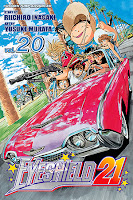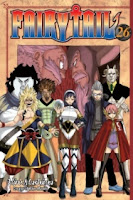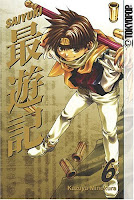My News and Reviews
In addition to the usual My Week in Manga feature, last week there were three posts here at Experiments in Manga. First off was the opening of the most recent manga giveaway. There’s still time to enter for a chance to win the first omnibus of Umineko: When They Cry. All you have to do is tell me about a manga based on a video game, visual novel, or dating sim. Next up was my review of Leslie Helm’s family memoir Yokohama Yankee: My Family’s Five Generations as Outsiders in Japan. It’s a fascinating and engaging book. And, like all of Chin Music Press’ publications, it’s beautifully designed as well. Finally, for those of you who are interested in my manga-buying habits, the Bookshelf Overload for May was also posted.
Quick Takes
 Eyeshield 21, Volumes 20-23 written by Riichiro Inagaki and illustrated by Yusuke Murata. All of the first round games in the Kanto Tournament are covered at least briefly in these volumes, but the game between the Shinryuji Nagas and the Deimon Devil Bats is the one that receives the most attention. This makes sense, since the Devil Bats are the “home” team in Eyeshield 21, but some of the other games are so abbreviated I’m not sure it was necessary to include them at all. Honestly, I would have liked to have seen them played out in more detail and I’m not even a huge football fan. Even so, I’m still enjoying Eyeshield 21. The characters are great and the artwork is fantastic. Overall, it’s simply a fun series.
Eyeshield 21, Volumes 20-23 written by Riichiro Inagaki and illustrated by Yusuke Murata. All of the first round games in the Kanto Tournament are covered at least briefly in these volumes, but the game between the Shinryuji Nagas and the Deimon Devil Bats is the one that receives the most attention. This makes sense, since the Devil Bats are the “home” team in Eyeshield 21, but some of the other games are so abbreviated I’m not sure it was necessary to include them at all. Honestly, I would have liked to have seen them played out in more detail and I’m not even a huge football fan. Even so, I’m still enjoying Eyeshield 21. The characters are great and the artwork is fantastic. Overall, it’s simply a fun series.
 Fairy Tail, Volume 26 by Hiro Mashima. Although I am vaguely familiar with Fairy Tail, the twenty-sixth volume is the first volume that I’ve actually had the opportunity to read. Even though I haven’t read the previous volumes, I can tell that this particular volume plays a pivotal role in the story with at least one huge plot twist and several possible deaths. (I say possible, because the characters seem to be extraordinarily resilient.) In this volume two guilds of magic users face off, Grimoire Heart and Fairy Tail, so there are plenty of battles to be had and over-the-top magic to be seen. Some of the individual fights have their moments but I wasn’t really wowed by any of them. Others seem to have been skipped over entirely, which was a little disappointing and anticlimactic in a few cases.
Fairy Tail, Volume 26 by Hiro Mashima. Although I am vaguely familiar with Fairy Tail, the twenty-sixth volume is the first volume that I’ve actually had the opportunity to read. Even though I haven’t read the previous volumes, I can tell that this particular volume plays a pivotal role in the story with at least one huge plot twist and several possible deaths. (I say possible, because the characters seem to be extraordinarily resilient.) In this volume two guilds of magic users face off, Grimoire Heart and Fairy Tail, so there are plenty of battles to be had and over-the-top magic to be seen. Some of the individual fights have their moments but I wasn’t really wowed by any of them. Others seem to have been skipped over entirely, which was a little disappointing and anticlimactic in a few cases.
 Love Share by Aoi Kujyou. Love Share is a collection of short boy’s love manga which all feature the same protagonists—the level-headed Kazushi and his more free-spirited friend and lover Izumi. There is no overarching plot to the volume; each story is a small (and sometimes confusing) glimpse into the two men’s lives at different points in their relationship. What appealed to me most about Love Share was the fluidity of Izumi and Kazuishi’s sexualities. Neither one of them is consigned to being the top or the bottom. Instead, they allow themselves to be caught up in the moment and let things proceed as they will. Both of them are completely capable of taking charge and they do.
Love Share by Aoi Kujyou. Love Share is a collection of short boy’s love manga which all feature the same protagonists—the level-headed Kazushi and his more free-spirited friend and lover Izumi. There is no overarching plot to the volume; each story is a small (and sometimes confusing) glimpse into the two men’s lives at different points in their relationship. What appealed to me most about Love Share was the fluidity of Izumi and Kazuishi’s sexualities. Neither one of them is consigned to being the top or the bottom. Instead, they allow themselves to be caught up in the moment and let things proceed as they will. Both of them are completely capable of taking charge and they do.
 Saiyuki, Volumes 6-9 by Kazuya Minekura. There may be plenty of parallels to The Journey to the West, the Chinese classic on which Saiyuki is very loosely based, but the original story is often nearly unrecognizable. The characters, too, tend to be quite different from their counterparts. I’ll admit though, I get a kick out of Saiyuki. I do find some of the intentional anachronisms that Minekura includes to be rather odd; they don’t always blend very well with the religious and magical aspects of the series. But then again, I seem to have no problem with Sanzo’s revolver or the fact that Jeep turns into, well, a jeep. Although the ninth volume concludes a major story-arc, Saiyuki doesn’t end here—after changing magazines (and demographics), the story continues in Saiyuki Reload.
Saiyuki, Volumes 6-9 by Kazuya Minekura. There may be plenty of parallels to The Journey to the West, the Chinese classic on which Saiyuki is very loosely based, but the original story is often nearly unrecognizable. The characters, too, tend to be quite different from their counterparts. I’ll admit though, I get a kick out of Saiyuki. I do find some of the intentional anachronisms that Minekura includes to be rather odd; they don’t always blend very well with the religious and magical aspects of the series. But then again, I seem to have no problem with Sanzo’s revolver or the fact that Jeep turns into, well, a jeep. Although the ninth volume concludes a major story-arc, Saiyuki doesn’t end here—after changing magazines (and demographics), the story continues in Saiyuki Reload.

Speak Your Mind